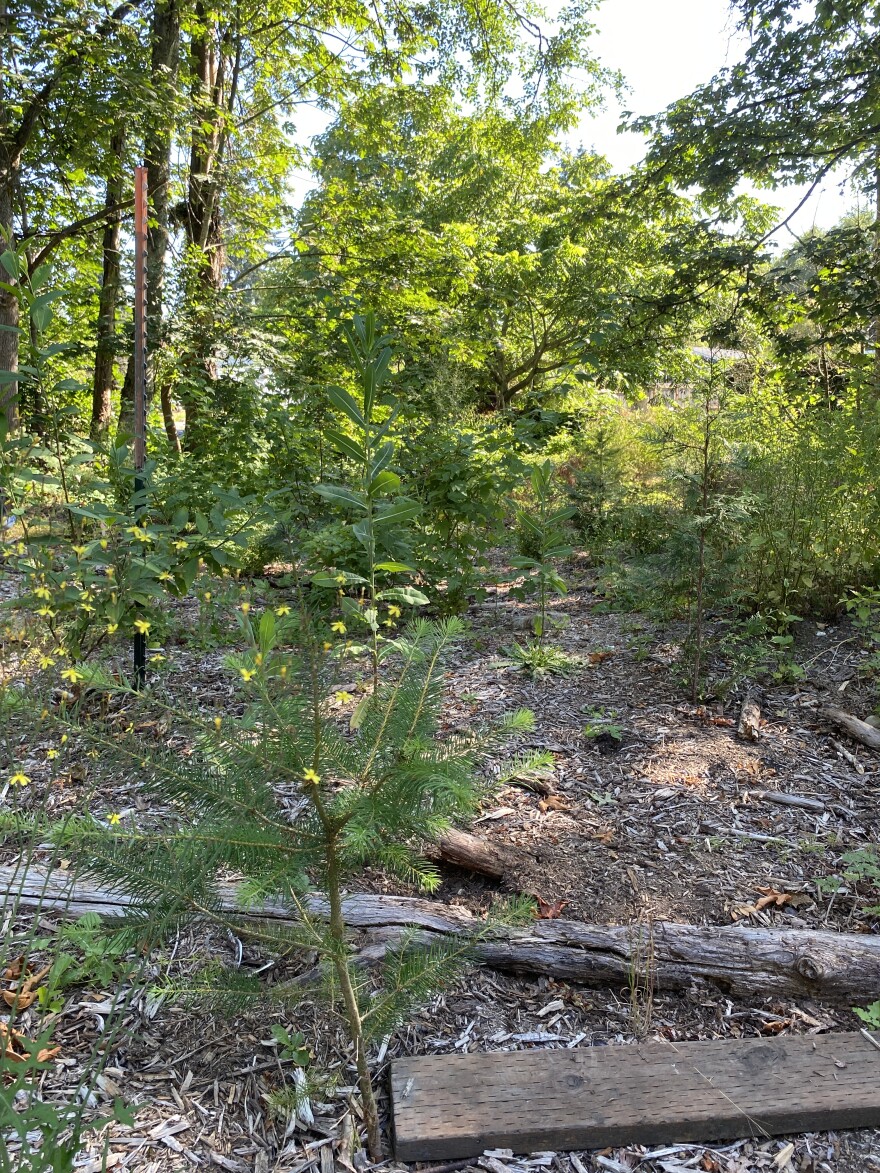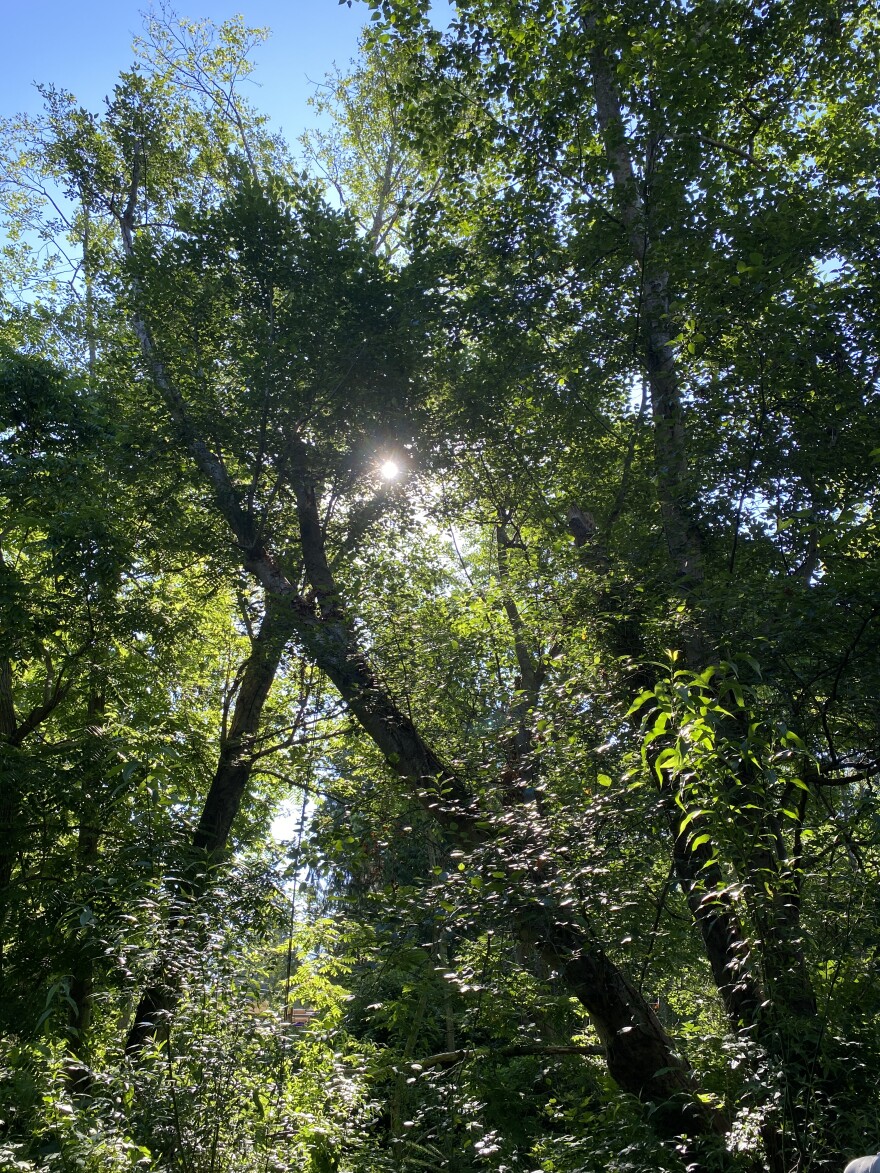Can Blockchain Help King County’s Urban Carbon Credits Go Further?
In June, King County made headlines for a major deal in the fight against climate change: three parcels of land — in King County, Issaquah and Shoreline — received the highest prices ever for carbon credits generated by urban forests.
The buyer is Regen Network Development, a Delaware-based blockchain company that plans to offer the credits for resale in the coming days. Regen is among several technology companies working to link carbon credits to digital tokens via blockchain, a system advocates say makes carbon credits more transparent and accountable.
To understand how these local trees can benefit from carbon credits supported by blockchain technology, KNKX visited one of the urban forest sites.
Carbon certification finances conservation efforts
Ballinger Open Space stands at the end of a cul-de-sac in a residential area north of Seattle. A stream in the middle of the plot has prevented development. The sound of birdsong here easily overpowers the dull pulse of traffic from I-5, the busy freeway nearby.
The Mountains to Sound Greenway Trust recently cleared two and a half hectares of invasive weeds here and planted nearly 2,000 trees. Restoration project manager Dan Hintz grinned ear-to-ear as he looked up at fast-growing black cottonwood, admiring how it soaks up carbon pollution.
“You can kind of see some of the really, really big leaves at the top of the tree, just soaking up sunlight,” he said, “going through the process of photosynthesis and, through that, taking a lot of carbon dioxide out of the air.”
He noted that this project is similar to many the groups have done over the years. But this one is certified by a carbon register, for the service the new trees provide: removing carbon from the atmosphere over the next 25 years.
“A lot of the project funding that you get for sites like this, you know, maybe only for three or four years. But having these credits, coming in every handful of years through the 25-year process, will generate revenue for us to continue to maintain and care for the site, Hintz said.
It’s a good cycle. If the trees grow well, the value of the credits will grow. And their sales fund conservation efforts over the life of the carbon contract.
While Ballinger Open Space generates its carbon credits through planting new trees, the other two sites included in Regen’s urban forest credit purchase generate carbon credits through conservation—protecting existing forests from development.
More value for urban carbon credits
City Forest Credits, a Seattle-based nonprofit carbon registry, calculated how much carbon is being absorbed at Ballinger Open Space. While larger registries tend to leverage large rural projects, City Forest Credits focus exclusively on smaller urban forestry projects.
“Unlike almost every other type of carbon credit, these are credits that have a societal impact,” said Mark McPherson, the organization’s founder and CEO.
“These are right where people live and breathe, recreate, work. And it’s a place for a smaller volume, really valuable — and hopefully higher priced credit,” he said.

Katie Egresi
/
Mountains to Sound Greenway Trust
The recent agreement for Ballinger Open Space and two other projects in King County validated that idea. It received some of the highest awards ever for carbon capture.
Regen paid more than $1 million to buy up all City Forest Credits available nationwide from 13 projects—a price nearly double that of rural forest carbon credits. The credits will be digitized as tokens for sale in Regen’s new marketplace.
King County forest carbon program manager Kathleen Farley Wolf said they typically sell their credits to locals buyers, to keep all the benefits in society. But this deal brought other benefits, including a completely new direction for the work.
“So we definitely — it’s a trade-off for us in sales,” Farley Wolf said. “But we decided on a very small number of credits to continue with it.”
Still, Farley Wolf said she had to learn a lot to get comfortable, including more about blockchain technologies.
Blockchain technology is a decentralized network of computers, which uses duplication to create an immutable record. Imagine a game of “telephone” where the last person actually receives the original message.
Based across the country, in Delaware, Regen runs on a blockchain – the same technology that powers Bitcoin and other cryptocurrencies. Many of these cause all kinds of carbon pollution, because they rely on huge amounts of computing power and servers running around the clock.
But Farley Wolf said she learned there are different types of blockchains. And the type Regen uses are not energy hogs.
“They gave us their carbon footprint. It’s extremely low. It’s 565 tons of carbon dioxide per year. They gave us the comparison with Bitcoin, which was 23 million tons per year,” Farley Wolf said.
The low carbon footprint and high-profile group sales at premium prices ultimately resolved any concerns, she said.
The role of blockchain in carbon credit markets
Since blockchains use decentralized computer networks to provide permanent records that cannot be changed, they produce trust, said Sreeram Kannan, a professor of computer engineering who runs a blockchain research lab at the University of Washington.
He said this technology could be a powerful tool for carbon credit markets and other ways to combat climate change. “Because we need global cooperation to solve something like the climate problem,” Kannan said.
“And blockchains provide mechanisms that non-trusting parties can come together and still have global shared information … And collaborate in a way that’s programmatic. And so I think blockchain is a good fit for climate change at a high level.”
But what about at the local level?
Kristian Kicinski, director of sustainability for Bassetti Architects in Seattle, said they have purchased City Forest Credits directly from King County for two years in a row now.
“This was something tangible. We can say that we helped protect these forested areas, in King County. And so it really made a lot of sense.”
He said it was easy to buy City Forest Credits locally. Now they are sold out for 2021 and he has yet to buy the next round for his company. He’s not sure what he wants to do.

Katie Egresi
/
Mountains to Sound Greenway Trust
Diving into the larger carbon credit market is not an easy option either.
One reason companies like Regen are marrying carbon credits and blockchain is because researchers have found carbon credits that exaggerated the amount of carbon absorbed, were fraudulent, or were sold multiple times. But not everyone is convinced that blockchain is the solution.
Nevertheless, it is part of Regen’s vision. Founded in 2017, the company participated in Techstar’s Sustainability Accelerator and has its roots in regenerative agriculture.
Sarah Baxendell, Regen director of ecosystem, recognizes the appeal of local buyers buying local credits. She encourages them to still do so through Regen, but said anyone interested in those City Forest Credits should be ready to act quickly.
“A lot of the projects are only a couple of hundred credits each, so they won’t really last long, especially if the communities are aware of when the credits go live on the market,” Baxendell said.
She said Regen bought them to boost their offerings when they launch the marketplace in mid-to-late September, because it can take years to create credits using their new tools, and City Forest Credits was a good fit. Baxendell said they are not looking to undercut local buyers.
Back in King County, a small Douglas fir continues its upward journey towards the sun.


